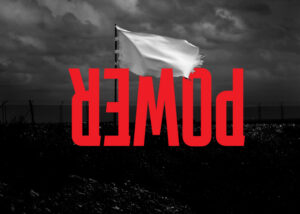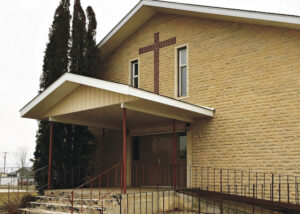March 19 was “PIE Day” at Toronto United Mennonite Church. Just before noon, attendants gradually moved out of the worship hall into the lobby for coffee and tea.
Two long tables soon filled with tarts and custards. Some people gawked at a mud pie with gummy worms and crumbled chocolate.
Children emerged from Sunday school rooms carrying a colourful “Happy PIE Day” banner, decorated with rainbows, blue crosses and stickers that read “more pie please.”
PIE stands for “public,” “intentional” and “explicit” in relation to LGBTQ+ affirmation within faith communities. The annual March event has roots in the United Church of Canada.
After helping themselves to dessert, congregants sat down to a table set with a stack of multicoloured cards and pens. They had previously been informed that several Mennonite Brethren (MB) churches across Canada had faced disciplinary measures for practising LGBTQ+-affirming theology. They arrived that Sunday prepared to write letters of support and thanks to these congregations.
Marieke Meyer serves as the church’s administrator. She recalls a very different chapter in the congregation’s life more than 20 years ago: “Our church went through a very difficult process that drove me away from this congregation for quite a few years.”
In April 2002, the church’s associate pastor for youth informed the community she was queer. After an extensive process of education, meetings and discussions, the church dismissed the youth pastor in June 2003.
It was not until November 2016 that the church would formally amend its policies, the result of other events and lengthy processes. The former youth pastor has since returned.
The change of policy also brought Meyer back. “Now that [the church] is affirming, I am so happily back and willing to be here and willing to celebrate with everyone who is welcome to be at God’s table,” she says.
At the letter-writing table, the church had displayed a page containing the names of affirming MB churches, including Southridge Community Church in St. Catharines, Ont., River East in Winnipeg, and FreeChurch in Toronto’s Annex neighbourhood.
FreeChurch and Southridge were suspended by the Ontario Conference of Mennonite Brethren Churches last October due to a lack of alignment with the MB Confession of Faith. The conference dismissed them on Feb. 25 of this year. River East remains part of the Mennonite Brethren conference in Manitoba although it has received a notice of suspension.
FreeChurch
Jon Osmond serves as senior pastor of FreeChurch. When he and his wife first joined in 2013, the church had what he described as the typical posture that other churches would have toward LGBTQ+ people. “We love you. We welcome you here, and then there was always this ‘but,’ ” he says.
He and the elders of the church had sensed that there were people who identified as LGBTQ+ although none of them were “out.” He also gathered a sense about them that they felt they could only go so far within the faith community.
Osmond says that elders of FreeChurch were at first unsure how to open discussions about LGBTQ+ members and same-sex marriage because of the subject’s potential to become divisive.
The elders carried on in their discussions, acknowledging that they would need to work as a team and listen to one another if they were to lead the community in this area.
“We would always say things like ‘the point is not to be right. The point is to love and understand the other,’ ” Osmond recalls.
Earlier in the process, the elders consulted literature from Justin Lee, author of Torn: Rescuing the Gospel from the Gays-vs.-Christians Debate, as well as other material to ensure queer voices were included. They also formed a working group of elders and seniors who met for discussions and discernment for several months.
By April 2019, the congregation formally defined its stance in its Living Document, although it did not make it public immediately.
Through this document, FreeChurch states that “LGBTQ+ people are deeply and dearly loved by God, and made in the image of God, and therefore have intrinsic value and are worthy of full inclusion into God’s spiritual family called the church.”
FreeChurch welcomes same-sex married persons to all levels of leadership and it calls for active repentance for the ways the church as an institution has oppressed, discriminated and isolated LGBTQ+ people.
Maple View Mennonite
Maple View Mennonite Church in Wellesley, Ont., also engaged in a thorough discernment process. It led to a different outcome.
When Mennonite Church Canada decided in 2016 to allow space for congregations to test LGBTQ+-related understandings other than that in the Confession of Faith in a Mennonite Perspective, Maple View felt the need to re-examine its denominational affiliation with Mennonite Church Eastern Canada.
Brent Kipfer, Maple View’s pastor, says that after revisiting biblical teaching on marriage and sexuality, and participating in a multi-year study process with the regional church, the congregation voted overwhelmingly in favour of leaving MC Eastern Canada. The church later joined the Ontario Conference of Mennonite Brethren Churches.
Kipfer says he recognizes the harm done by the church to LGBTQ+ people. “We recognize that we have ongoing learning to do on how to love LGBTQ+ brothers and sisters,” he says, “but we want to do that within a traditional framework of marriage and sexuality.”
Kipfer also says that he and others at Maple View have ongoing contact with MC Canada people through family, friends and community, and that they genuinely value this. He also says they did not want their decision about leaving MC Eastern Canada to be seen as “a judgment about who’s more solidly in the Kingdom of God.”
In addition to Maple View, Kingsfield-Zurich Mennonite Church also switched its affiliation from MC Eastern Canada to MB. Some churches that left MC Canada have remained unaffiliated or have joined non-Mennonite denominations.
On the flip side, Canadian Mennonite is aware of two MB churches elsewhere in Canada that have talked to MC Canada regional churches about the possibility of affiliation. Earlier this year, a church from the Evangelical Mennonite Conference joined MC Manitoba, though for different reasons.
Jon Osmond says that his congregation did not want to leave the MB denomination. They felt it was a greater witness to express a love of unity instead of a divide.
Currently, FreeChurch is “in a season of discernment regarding joining a denomination,” he says. “We are considering ones with an Anabaptist theology, and obviously those who are open to churches including LGBTQ+ folk into full membership and leadership.”
After years of wrestling and discussion, FreeChurch went public with its Living Document when COVID restrictions were still in place. MB churches across Canada began to express their disappointment and demands that FreeChurch change its views. At the same time, the congregation noticed more LGBTQ+ folks connecting via video conference for Sunday sermons.
“Still, we didn’t expect the floodgates of folks who have come. It’s been a really beautiful thing,” Osmond says.
Do you have a story idea about Mennonites in eastern Canada? Send it to Madalene Arias at ec@canadianmennonite.org.








Leave a Reply
You must be logged in to post a comment.